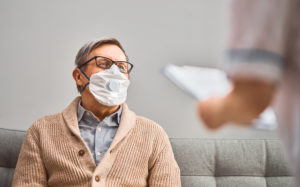How to Be a Good Caregiver

If you find yourself suddenly in a caregiving role, you may not know where to begin. CaringBridge’s recent article entitled “5 Tips to Be a Good Caregiver” provides some great advice on how to be a good caregiver.
Communicate. This is the most important factor, when trying to be a good caregiver. Caregivers should strive to communicate with patience, understanding and empathy. A person being taken care of can sometimes feel like they’re a burden or a nuisance. Good communication and reassurance can help prevent that. You should also have communication between you and your other family and friends. Asking for help isn’t always easy, but those who care about you will want to support you.
Take Care of Yourself. When you’re constantly on call caring for a person who is ill, it’s easy to forget about your own needs. Caregivers can be so overwhelmed that they’re unable to take time for their other family or interests. They can feel guilty being away from the person in need. Studies even show that serving as a caregiver often takes a toll on the caregiver’s health.
Your health and well-being are important too, and you can’t be a good caregiver to your loved one if you aren’t healthy. Prioritize your own health, physical and mental—it’s vital for both you and your loved one.
Have a Lot of Patience. This is important because it’s helpful to be patient with yourself. You’ll make mistakes, but remember that you’re trying your best, and no one’s perfect. You should also be aware that communication can sometimes be difficult when you’re caregiving. Your loved one might say or do something that hurts your feelings. This is often due to the underlying illness which may affect your loved one’s personality. However, do your best to be patient and empathetic. Don’t take it personally. Try to look at the situation with understanding and acceptance to battle discouragement. This article provides guidance on the topic as well. https://galligan-law.com/caring-for-an-elderly-parent-without-ruining-your-relationship/
Create Boundaries. When spending so much time with one person, and sharing their most intimate moments, it’s still important to have some boundaries. These can include you knowing your own limitations and what you’re comfortable doing for that person. Boundaries also apply to the person receiving the care and things, such as the way in which that want to be cared for and their likes and dislikes. Boundaries allow both people to be happier.
Remind Yourself of Your Mission. Sometimes, you can become a caregiver out of necessity or a sudden crisis. Nonetheless, at the center of the situation is love and empathy. Caregivers love and want the best for the person they’re helping. You should try to harness that compassion to keep you motivated through hard times.
Get Help. With so many people serving as caregivers across the country, there are a wealth of resources to support caregivers and their loved ones. Organizations like the Alzheimer’s Association, Dementia Society and others have information, support groups and other resources to help you in your mission.
Remember that a good caregiver is one who cares. You’re not expected to be perfect, so make certain that you give yourself just as much love and patience as you offer your patient.
Reference: CaringBridge (Feb. 13, 2020) “5 Tips to Be a Good Caregiver”

